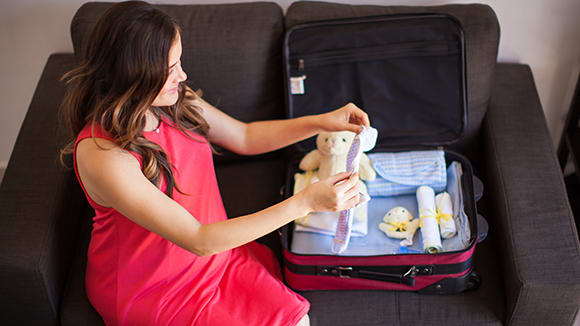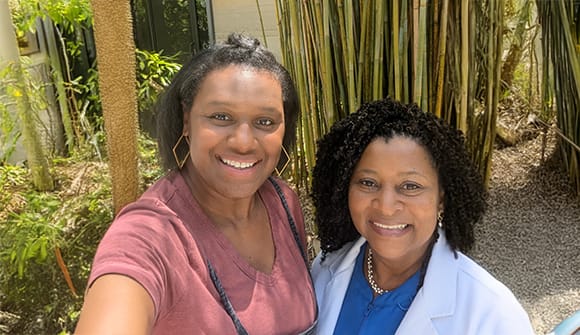7 steps to prepare for baby
Checklist to help navigate the choices before, during and after giving birth.
Article Author: Beth Stambaugh
Article Date:

Expecting your first baby is exciting, but it can also be overwhelming. There’s so much to decide and a firm deadline to boot.
How to prepare for baby's arrival
We’ve assembled a handy checklist to help you navigate the choices before, during and after the special event. But before we get to the checklist, remember to relax; don’t let all the preparation overshadow the joy and anticipation you feel.
1. Prioritize your own care.
If you just found out you’re pregnant, take care of your body first. Eat healthy, exercise, limit caffeine and cut out alcohol.
2. Sign up for classes.
Nine months go by fast, so consider signing up for classes as soon as you know you’re pregnant. These informational sessions can help guide you through every step of your pregnancy. Baptist Health conveniently offers in-person, virtual and pre-recorded classes. You can start by taking advantage of the latest evidence-based prenatal care recommendations through the free Understanding Pregnancy (Early Pregnancy) pre-recorded class. The course teaches expectant mothers and their support people how to make healthy lifestyle choices. Another helpful course is the Childbirth Preparation class, recommended during the second trimester, which covers what to expect during the birthing process, pain management, cesarean birth and postpartum care.
“I believe the most important reason to take a childbirth preparation class is that education and preparation are power,” said Kathleen Hugo, RN, IBCLC, a certified childbirth educator and lactation consultant at Baptist Medical Center Jacksonville. “It helps reduce fears of the unknown and empowers moms to make good decisions. It’s also a great way to meet new people who are going through the same thing you are.”
Make sure to sign up early because classes fill up quickly.
3. Create a birth plan.
Your birth plan will help you choose your obstetrician, which will determine where you’ll deliver your baby. You’ll also decide whether to try for an unmedicated birth or choose to have an epidural and pain medication. There are lots of choices for moms these days, so read up on what makes the most sense for you, your beliefs and your pain threshold. And avoid awkward situations by picking who you want in the room with you before the big day arrives.
4. Pick your team.
One of the most important people on your team once your baby is born is the pediatrician or family physician, and the first checkup comes just one or two days after you leave the hospital. Find a provider you like and feel comfortable with, ideally before you give birth. Most offer a free prenatal appointment or “meet the doctor” night so parents can ask questions and get information about the practice. Common topics to ask about include vaccinations, circumcision, feeding and much more.
5. Navigate the hospital paperwork.
Hospitals encourage expectant moms to preregister for their stay once they are beyond 20 weeks pregnant. Registering ahead allows the hospital to get the mom-to-be’s name, insurance information and obstetrician’s contact information into the system so it’s already there when they arrive. At Baptist Health, registration can be done in person or through My Baptist Chart. Make sure to bring your photo ID and insurance card with you.
6. Pack your bags early.
Put some thought into what necessities you’d like to have to help keep yourself comfortable, such as lip balm, snacks, eyeglasses, a comfy bathrobe, nursing bra and a going-home outfit for your baby. Many Labor and Delivery Centers feature environments that are more like being at home, with the addition of some special amenities. Maternity rooms at Baptist Health often have spa-like suites for moms to bond with their newborns. These rooms offer sleeper sofas and recliners and have large private bathrooms. You can view pictures of the maternity area at your chosen Baptist Health hospital online before your due date.
7. Secure your baby's ride home.
Taking your newborn home can be a little scary as you leave the protective environment of the hospital, but you’ll feel better if you’re comfortable with how the car seat works and how to install it. Experts recommend going through several practice runs before your baby arrives and getting the car seat inspected to ensure it’s properly installed.
“More than half of car seats are installed incorrectly,” said Jessica Winberry, prevention coordinator for Safe Kids Northeast Florida, led by THE PLAYERS Center for Child Health at Wolfson Children’s Hospital. “There are so many different kinds of car seats and they all install a bit differently. Having a properly installed car seat and ensuring your child is correctly harnessed in it can greatly reduce the risk of injury.”
Safe Kids Northeast Florida offers a Safe Kids Buckle Up® inspection station with free car and booster seat checks by certified child passenger safety technicians. For more information, call 904.202.4302.
Want more helpful tips on how to prepare for the arrival of your baby?
Visit baptistjax.com/baby. Looking for a pediatrician? Let one of our care coordinators match you with a pediatrician who's right for your family. Same-day and next-day appointments available. Call 904.202.4YOU(4968) or fill out our appointment request form.


